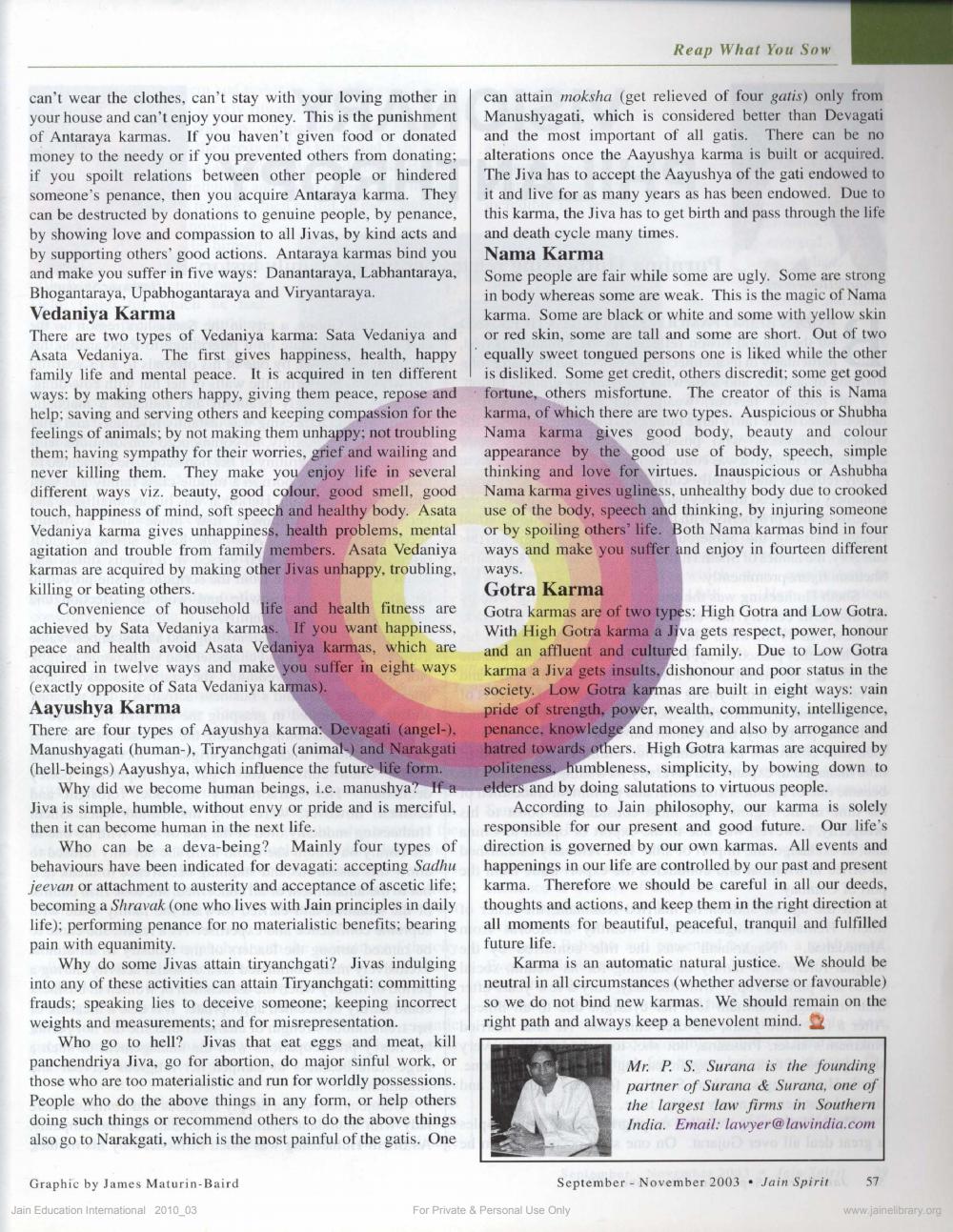________________
can't wear the clothes, can't stay with your loving mother in your house and can't enjoy your money. This is the punishment of Antaraya karmas. If you haven't given food or donated money to the needy or if you prevented others from donating; if you spoilt relations between other people or hindered someone's penance, then you acquire Antaraya karma. They can be destructed by donations to genuine people, by penance, by showing love and compassion to all Jivas, by kind acts and by supporting others' good actions. Antaraya karmas bind you and make you suffer in five ways: Danantaraya, Labhantaraya, Bhogantaraya, Upabhogantaraya and Viryantaraya. Vedaniya Karma
There are two types of Vedaniya karma: Sata Vedaniya and Asata Vedaniya. The first gives happiness, health, happy family life and mental peace. It is acquired in ten different ways: by making others happy, giving them peace, repose and help; saving and serving others and keeping compassion for the feelings of animals; by not making them unhappy; not troubling them; having sympathy for their worries, grief and wailing and never killing them. They make you enjoy life in several different ways viz. beauty, good colour, good smell, good touch, happiness of mind, soft speech and healthy body. Asata Vedaniya karma gives unhappiness, health problems, mental agitation and trouble from family members. Asata Vedaniya karmas are acquired by making other Jivas unhappy, troubling, killing or beating others.
Convenience of household life and health fitness are achieved by Sata Vedaniya karmas. If you want happiness, peace and health avoid Asata Vedaniya karmas, which are acquired in twelve ways and make you suffer in eight ways (exactly opposite of Sata Vedaniya karmas). Aayushya Karma
There are four types of Aayushya karma: Devagati (angel-), Manushyagati (human-), Tiryanchgati (animal) and Narakgati (hell-beings) Aayushya, which influence the future life form.
Why did we become human beings, i.e. manushya? If a Jiva is simple, humble, without envy or pride and is merciful, then it can become human in the next life.
Who can be a deva-being? Mainly four types of behaviours have been indicated for devagati: accepting Sadhu jeevan or attachment to austerity and acceptance of ascetic life; becoming a Shravak (one who lives with Jain principles in daily life); performing penance for no materialistic benefits; bearing pain with equanimity.
Why do some Jivas attain tiryanchgati? Jivas indulging into any of these activities can attain Tiryanchgati: committing frauds; speaking lies to deceive someone; keeping incorrect weights and measurements; and for misrepresentation.
Who go to hell? Jivas that eat eggs and meat, kill panchendriya Jiva, go for abortion, do major sinful work, or those who are too materialistic and run for worldly possessions. People who do the above things in any form, or help others doing such things or recommend others to do the above things also go to Narakgati, which is the most painful of the gatis. One
Graphic by James Maturin-Baird
Jain Education International 2010_03
Reap What You Sow
can attain moksha (get relieved of four gatis) only from Manushyagati, which is considered better than Devagati and the most important of all gatis. There can be no alterations once the Aayushya karma is built or acquired. The Jiva has to accept the Aayushya of the gati endowed to it and live for as many years as has been endowed. Due to this karma, the Jiva has to get birth and pass through the life and death cycle many times. Nama Karma
Some people are fair while some are ugly. Some are strong in body whereas some are weak. This is the magic of Nama karma. Some are black or white and some with yellow skin or red skin, some are tall and some are short. Out of two equally sweet tongued persons one is liked while the other is disliked. Some get credit, others discredit; some get good fortune, others misfortune. The creator of this is Nama karma, of which there are two types. Auspicious or Shubha Nama karma gives good body, beauty and colour appearance by the good use of body, speech, simple thinking and love for virtues. Inauspicious or Ashubha Nama karma gives ugliness, unhealthy body due to crooked use of the body, speech and thinking, by injuring someone or by spoiling others' life. Both Nama karmas bind in four ways and make you suffer and enjoy in fourteen different
ways.
Gotra Karma
Gotra karmas are of two types: High Gotra and Low Gotra. With High Gotra karma a Jiva gets respect, power, honour and an affluent and cultured family. Due to Low Gotra karma a Jiva gets insults, dishonour and poor status in the society. Low Gotra karmas are built in eight ways: vain pride of strength, power, wealth, community, intelligence, penance, knowledge and money and also by arrogance and hatred towards others. High Gotra karmas are acquired by politeness, humbleness, simplicity, by bowing down to elders and by doing salutations to virtuous people.
According to Jain philosophy, our karma is solely responsible for our present and good future. Our life's direction is governed by our own karmas. All events and happenings in our life are controlled by our past and present karma. Therefore we should be careful in all our deeds, thoughts and actions, and keep them in the right direction at all moments for beautiful, peaceful, tranquil and fulfilled future life.
Karma is an automatic natural justice. We should be neutral in all circumstances (whether adverse or favourable) so we do not bind new karmas. We should remain on the right path and always keep a benevolent mind.
Mr. P. S. Surana is the founding partner of Surana & Surana, one of the largest law firms in Southern India. Email:
[email protected]
no
September November 2003 Jain Spirit
For Private & Personal Use Only
57
www.jainelibrary.org
